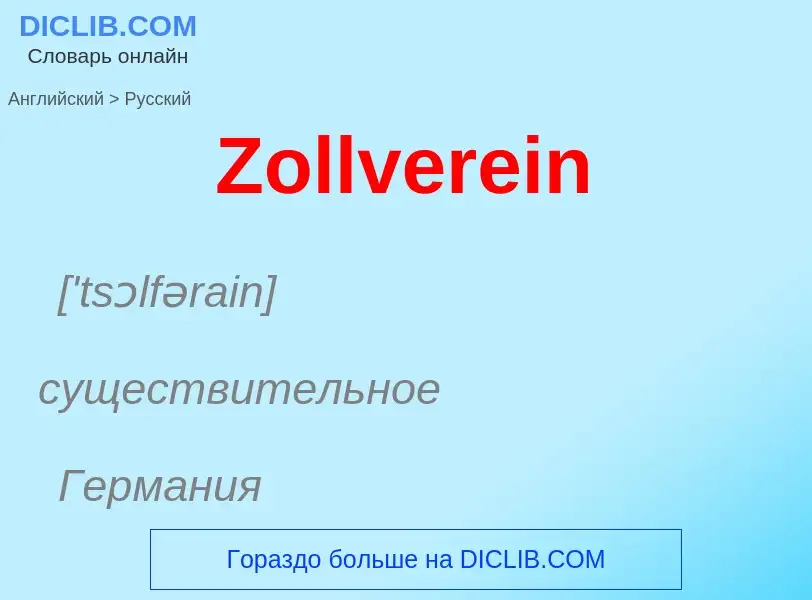ترجمة وتحليل الكلمات عن طريق الذكاء الاصطناعي ChatGPT
في هذه الصفحة يمكنك الحصول على تحليل مفصل لكلمة أو عبارة باستخدام أفضل تقنيات الذكاء الاصطناعي المتوفرة اليوم:
- كيف يتم استخدام الكلمة في اللغة
- تردد الكلمة
- ما إذا كانت الكلمة تستخدم في كثير من الأحيان في اللغة المنطوقة أو المكتوبة
- خيارات الترجمة إلى الروسية أو الإسبانية، على التوالي
- أمثلة على استخدام الكلمة (عدة عبارات مع الترجمة)
- أصل الكلمة
Zollverein - ترجمة إلى الروسية
['tsɔlfərain]
существительное
Германия
таможенный союз
تعريف
ويكيبيديا
The Zollverein (pronounced [ˈtsɔlfɛɐ̯ˌʔaɪn]), or German Customs Union, was a coalition of German states formed to manage tariffs and economic policies within their territories. Organized by the 1833 Zollverein treaties, it formally started on 1 January 1834. However, its foundations had been in development from 1818 with the creation of a variety of custom unions among the German states. By 1866, the Zollverein included most of the German states. The Zollverein was not part of the German Confederation (1815-1866).
The foundation of the Zollverein was the first instance in history in which independent states consummated a full economic union without the simultaneous creation of a political federation or union.
Prussia was the primary driver behind the creation of the customs union. Austria was excluded from the Zollverein because of its highly protectionist trade policy, the unwillingness to split its customs territory into the separate Austrian, Hungarian and Galician-Lodomerian ones, as well as due to opposition of Prince von Metternich to the idea. By the founding of the North German Confederation in 1867, the Zollverein covered states of approximately 425,000 square kilometres (164,000 sq mi), and had produced economic agreements with several non-German states, including Sweden–Norway. After the founding of the German Empire in 1871, the Empire assumed the control of the customs union. However, not all states within the Empire were part of the Zollverein until 1888 (Hamburg for example). Conversely, though Luxembourg was a state independent of the German Reich, it remained in the Zollverein until 1919.

![(1839 oil painting by Caroline Hövemeyer at the ''Heimatmuseum [[Reutlingen]]''.)}}}} (1839 oil painting by Caroline Hövemeyer at the ''Heimatmuseum [[Reutlingen]]''.)}}}}](https://commons.wikimedia.org/wiki/Special:FilePath/Friedrich List 1839.jpg?width=200)
![Johann F. Cotta]].<br/>Cotta played an important role in the development of the south German customs agreement and also negotiated the Prussian Hessian Customs agreements. Johann F. Cotta]].<br/>Cotta played an important role in the development of the south German customs agreement and also negotiated the Prussian Hessian Customs agreements.](https://commons.wikimedia.org/wiki/Special:FilePath/Johann Friedrich Freiherr von Cotta.png?width=200)
![Bavaria]]. (The territories which became the [[Grand Duchy of Hesse]] are also shown.) Bavaria]]. (The territories which became the [[Grand Duchy of Hesse]] are also shown.)](https://commons.wikimedia.org/wiki/Special:FilePath/Sueddeutsche Staaten.jpg?width=200)
